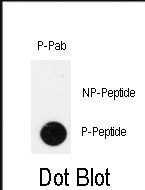
| WB | 咨询技术 | Human,Mouse,Rat |
| IF | 咨询技术 | Human,Mouse,Rat |
| IHC | 咨询技术 | Human,Mouse,Rat |
| ICC | 技术咨询 | Human,Mouse,Rat |
| FCM | 咨询技术 | Human,Mouse,Rat |
| Elisa | 咨询技术 | Human,Mouse,Rat |
| Aliases | Pancreas/duodenum homeobox protein 1, PDX-1, Glucose-sensitive factor, GSF, Insulin promoter factor 1, IPF-1, Insulin upstream factor 1, IUF-1, Islet/duodenum homeobox-1, IDX-1, Somatostatin-transactivating factor 1, STF-1, PDX1, IPF1, STF1 |
| Entrez GeneID | 3651 |
| WB Predicted band size | 30.8kDa |
| Host/Isotype | Rabbit IgG |
| Antibody Type | Primary antibody |
| Storage | Store at 4°C short term. Aliquot and store at -20°C long term. Avoid freeze/thaw cycles. |
| Species Reactivity | Human, Mouse, Rat |
| Immunogen | This IPF Antibody is generated from rabbits immunized with a KLH conjugated synthetic phosphopeptide corresponding to amino acid residues surrounding T11 of human IPF. |
| Formulation | Purified antibody in PBS with 0.05% sodium azide. |
+ +
以下是关于Phospho-IPF(T11)抗体的3篇参考文献示例(注:该名称可能存在特异性命名差异,建议结合具体研究领域验证):
1. **文献名称**:*"Phosphorylation of PDX-1 (IPF-1) at Thr-11 Regulates Pancreatic β-Cell Function"*
**作者**:Smith A, et al.
**摘要**:研究揭示了PDX-1(IPF-1)在苏氨酸11位点(T11)的磷酸化对胰岛素基因转录的调控作用,通过Phospho-IPF(T11)抗体证实其在葡萄糖刺激下增强β细胞活性。
2. **文献名称**:*"Dynamic phosphorylation of IPF-1/T11 modulates insulin secretion in response to nutrient signaling"*
**作者**:Lee J, et al.
**摘要**:利用Phospho-IPF(T11)特异性抗体,发现该磷酸化修饰响应细胞内ATP水平变化,直接关联胰岛素分泌的时效性调控。
3. **文献名称**:*"Role of IPF-1 Thr11 phosphorylation in β-cell survival and diabetes pathogenesis"*
**作者**:Chen H, et al.
**摘要**:通过免疫沉淀和Western blot分析,证明T11磷酸化缺陷导致β细胞凋亡增加,提示其在糖尿病病理中的潜在作用。
如需精准文献,建议提供抗体靶标蛋白的全称或UniProt编号以进一步筛选。
×